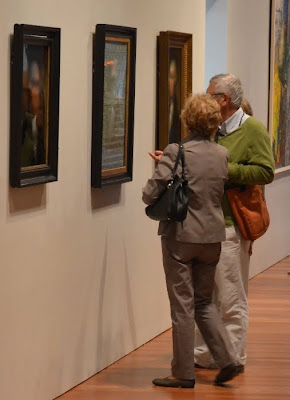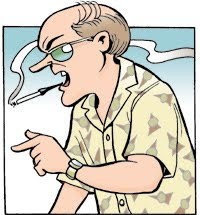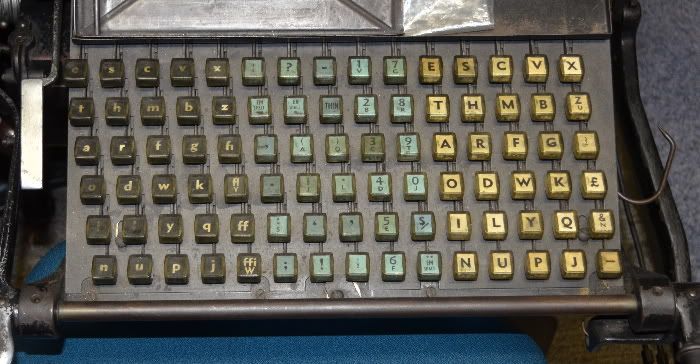Monday, December 26, 2011
Surviving for the fans
Depth Vs Breadth
A slight 100 years ago people were generally deeply read, but not widely read, meaning that they read the bible and perhaps a few other books deeply, but they had not read widely. It wasn't until the appearance of Mechanic's Institutes, public libraries, and more frequently found fee-based lending libraries that people began to read more widely and less deeply.
It appears that today the trend is toward technical reading and away from wide or deep reading. The purpose of technical reading is to extract information from a screen full of a mix of images, graphics, and text. This type of heavily graphics-oriented reading wasn't practical when I was young--in the 1950s. Up until the advent of the microcomputer graphics--especially color graphics--was an expensive proposition for print. Dense (and cheap) text was the norm.
As usual with technological advance it is difficult to grasp the qualitative differences in change. Really, is the change good or bad? Or, is it more likely that the result is just something "different"? With "deep" reading people could quote and recognize homilies from the bible. With "wide" reading that didn't happen so often, but we could identify the "sound" or structure of Shakespeare, a cowboy and indians tale, or a British spy story.
With technical reading people tend to think in multiple dimensions and see "exploded" technical images in their minds that they can rotate in multiple dimensions--graphical images of glaciers moving in and melting, images of the solar system rotating about multiple axes. Tricks like that make understanding concepts difficult to describe using just words, like evolution, suddenly simple to understand. Different techniques, different results. Not better, not worse, just different and adapted for the times.
Friday, October 28, 2011
A magazine is a broken iPad
Sunday, September 11, 2011
Saturday, August 6, 2011
Rare Inspiration 1
"When I read something saying I've not done anything as good as Catch-22 I'm tempted to reply, 'Who has?'"Joseph Heller, as quoted in The Oxford Dictionary of Literary Quotations (1997)
Sunday, July 10, 2011
Hoy Max!


Wednesday, June 1, 2011
Smug? Cultured? You're right!
 Innocent art hounds at the de Young gallery, San Francisco. [James]
Innocent art hounds at the de Young gallery, San Francisco. [James]This report here, on a report here, states:
Cultured people happier, less stressedPeople who go to museums and concerts or create art or play an instrument are more satisfied with their lives, regardless of how educated or rich they are, according to a study.But the link between culture and feeling good about oneself is not quite the same in both sexes, according to the study, published in the British Medical Association's Journal of Epidemiology and Community Health.For men, passive activities such as taking in a concert or museum exhibition are associated with an upbeat mood and better health, it found.For women, though, the link is active, in that they were less likely to feel anxious, depressed or feel unwell if they played music or created art.
Researchers led by Koenraad Cuypers of the Norwegian University of Science and Technology analysed information culled from 50,797 adults living in Norway's Nord-Trondelag County.
Wednesday, May 25, 2011
Gnome Balcony

We're delighted to announce the publication of a new poetry chapbook by Ross Kightly*, entitled Gnome Balcony from HappenStance Press, and recommended for your core poetry collections, obviously now incomplete without. Available here.
Monday, February 7, 2011
Sincerity may not Flatter - Duke & Thompson...

If you were the drug-taking inventor of Gonzo Journalism, you'd think it would be hard to feel insuted by anything except being charecterised as an upstanding, sober WASP, but Hunter S. Thompson was insulted by an accurate 'portrait', saying:
"some people grow up and want to be firemen, and some want to be president; nobody wants to grow up and be a cartoon character"That was in answer to being questioned on the fact that Doonesbury cartoon character 'Uncle Duke' was initially based on Gonzo journalist Hunter S. Thompson's pseudonymous self-portrait, Raoul Duke.
'Uncle Duke'
"Uncle" of Zonker, former Rolling Stone writer, governor of American Samoa and ambassador to China, once the proconsul of Panama, former owner of "Club Scud" in Kuwait City, ex-orphanage manager (where he realized one of the orphans, Earl, was his son), and former mayor of the fictional Al Amok, Iraq. He has also been a drug smuggler (and heavy user), an enemy of John Denver, manager of the Washington Redskins, toady to Donald Trump, and a zombie slave to ex-Haitian President Jean-Claude Duvalier.
Hunter S Thopmson
Hunter Stockton Thompson (July 18, 1937 – February 20, 2005) was an American journalist and author who wrote Fear and Loathing in Las Vegas (1971) and Fear and Loathing on the Campaign Trail '72 (1973).
He is credited as the creator of Gonzo journalism, a style of reporting where reporters involve themselves in the action to such a degree that they become central figures of their stories. He is known also for his unrepentant lifelong use of alcohol, LSD, marijuana, and cocaine (among other substances); his love of firearms; his long-standing hatred of Richard Nixon; and his iconoclastic contempt for authoritarianism. While suffering a bout of health problems, he committed suicide in 2005, at the age of 67.
It's hard to surprise when you spend your whole life 'out there' like Hunter S did, but I reckon the above quote is pretty odd, however you cut it. More typical of the man is:
“I hate to advocate weird chemicals, alcohol, violence or insanity to anyone . . . but they’ve always worked for me.”We need more writers like that.
Friday, January 21, 2011
A Detective's Oxford Rail Experience

As well as writing delightfully excessive locked room mysteries, Crispin clearly loved nailing the foibles of the various 'sets' he dealt with in his professional, real, career as Bruce Montgomery, composer and film-score writer. In these areas he is acidly accurate, and the books are enjoyable for these summations of a time, place, people and profession. But, as many good whodunit writers also did, Crispin enjoyed making irrelevant seeming pen sketches, which at the most served to set an atmosphere, usually containing no clue to the mystery, but being at times some of the most enjoyable polemical writing of an almost Swiftian level. There are two I particularly enjoy among all the others; one on poets in heaven, which I may post another time, and the following item from the very beginning of his first book The Case of the Gilded Fly. It's what you get when you cross a Classical education with the essentials of a British railway journey. They're cleaner now, without steam engines and smoking carriages, and Oxford's station has been removed and replaced with a modern monstrosity, but the experience has so often simply not changed at all:
1. Prologue in Railway TrainsHis crime thrillers aren't to all tastes, being knowing, ridiculously over-complex, arch and allusive, sometimes to the level of simple pretension (but often succeed in making the reader feel rather a literary and educated man of the world - when it works). I find them endlessly re-readable. After all you want to know what happens next, don't you?
To the unwary traveller, Didcot signifies the imminence of his arrival at Oxford; to the more experienced, another half-hour at least of frustration. And travellers in general are divided into these two classes; the first apologetically haul down their luggage from the racks on to the seats, where it remains until the end of the journey, an encumbrance and a mass of sharp, unexpected edges; the second continue to stare gloomily out of the window at the waste of woods and fields into which, by some witless godling, the station bas been inexplicably dumped, and at the lines of goods trucks from ail parts of the country, assembled like the isle of lost ships of current myth, in the middle of a Sargasso Sea. A persistent accompaniment of dark muttering and shouting, together with a brisk tearing of wood and metal reminiscent of early Walpurgis Night in a local cemetery, suggest to the more imaginative of the passengers that the engine is being dismantled and put together again. The delay in Didcot station amounts as a rule to twenty minutes or more.
Then there are about three fausses sorties, involving a tremendous crashing and jolting of machinery which buffets the passengers into a state of abject submission. With infinite reluctance, the cortege gets on the move at last, carrying its unhappy cargo in an extremely leisurely manner through the flat landscape. There are quite a surprising number of wayside stations and halts before you arrive at Oxford, and it misses none of these, often lingering at them beyond all reason, since no one gets either in or out; but perhaps the guard has seen someone hurrying belatedly down the station road, or has observed a local inhabitant asleep in his corner and is reluctant to wake him; perhaps there is a cow on the line, or the signal is against us - investigation, however, proves that there is no cow, nor even any signal, pro or contra.
Towards Oxford matters become a little more cheerful. Within sight of the canal, say, or Tom Tower. An atmosphere of purposefulness begins to be felt; it requires the utmost strength of will to remain seated, and hatless, and coatless, with one's luggage still in the rack and one's ticket still in an inside pocket; and the more hopeful occupants are already clambering into the corridors. But sure enough, the train stops just outside the station, the monolithic apparitions of a gas-works on one side, a cemetery on the other, by which the engine lingers with ghoulish insistence, emitting sporadic shrieks and groans of necrophilous delight. A sense of wild, itching frustration sets in; there is Oxford, there, a few yards away, is the station, and here is the train, and passengers are not allowed to walk along the line, even if any of them had the initiative to do so; it is the whole torture of Tantalus in hell. This interlude of memento mori, during which the railway company reminds the golden lads and girls in its charge of their inevitable coming to dust, goes on usually for about ten minutes, after which the train proceeds grudgingly into that station so aptly called by Max Beerbohm 'the last relic of the Middle Ages'.
But if any traveller imagines that this is the end, he is mistaken. Upon arrival there, when even the most sceptical have begun to shift about, it is at once discovered that the train is not at a platform at all, but on one of the centre lines. On either side, waiting friends and relations, balked at the eleventh hour of their re-union, rush hither and thither waving and uttering little cries, or stand with glum, anxious faces trying to catch a glimpse of those they are supposed to be meeting. It is as if Charon's boat were to become inextricably marooned in the middle of the Styx, unable either to proceed towards the dead or to return to the living. Meanwhile, internal shudderings of seismic magnitude occur which throw the passengers and their luggage into impotent shouting heaps on the floors of the corridors. In a few moments, those on the station are surprised to see the train disappearing in the direction of Manchester, with a cloud of smoke and an evil smell. In due time it returns backwards, and, miraculously, the journey is over.
James
Thursday, January 13, 2011
Marieke Hardy on acting vs writing
"I mean, you can sit in your living room and write, but you can't sit in your living room and act. Well, you can, but people start to call the authorities."In The Age.

